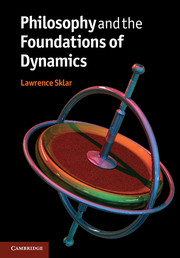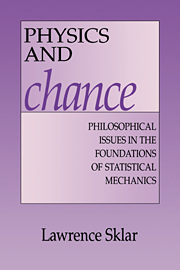Philosophy and the Foundations of Dynamics
£75.00
- Author: Lawrence Sklar, University of Michigan, Ann Arbor
- Date Published: November 2012
- availability: Available
- format: Hardback
- isbn: 9780521888196
£
75.00
Hardback
Other available formats:
Paperback, eBook
Looking for an inspection copy?
This title is not currently available on inspection
-
Although now replaced by more modern theories, classical mechanics remains a core foundational element of physical theory. From its inception, the theory of dynamics has been riddled with conceptual issues and differing philosophical interpretations and throughout its long historical development, it has shown subtle conceptual refinement. The interpretive program for the theory has also shown deep evolutionary change over time. Lawrence Sklar discusses crucial issues in the central theory from which contemporary foundational theories are derived and shows how some core issues (the nature of force, the place of absolute reference frames) have nevertheless remained deep puzzles despite the increasingly sophisticated understanding of the theory which has been acquired over time. His book will be of great interest to philosophers of science, philosophers in general and physicists concerned with foundational interpretive issues in their field.
Read more- Extensive treatment of the philosophical issues in dynamics, including a discussion on the crucial issues in the central theory from which contemporary foundational theories are derived
- Shows how a single theory and its understanding can indicate deep evolutionary changes over time
- Places dynamics within the context of general physical theories
Reviews & endorsements
'This work could be as influential in the 21st century as Ernst Mach's Die Mechanik (1901) was in the 20th, both in physics and philosophy … Highly recommended. Upper-division undergraduates, graduate students, and researchers/faculty.' P. D. Skiff, Choice
Customer reviews
Not yet reviewed
Be the first to review
Review was not posted due to profanity
×Product details
- Date Published: November 2012
- format: Hardback
- isbn: 9780521888196
- length: 279 pages
- dimensions: 254 x 178 x 18 mm
- weight: 0.72kg
- availability: Available
Table of Contents
1. Introduction
2. The prehistory of classical dynamics
3. The astronomical revolution
4. Precursors to Newtonian dynamics
5. The Newtonian synthesis
6. Philosophical aspects of the Newtonian synthesis
7. The history of statics
8. The development of dynamics after Newton
9. The 'Newtonian' approach after Newton
10. From virtual work to Lagrange's equation
11. Extremal principles
12. Some philosophical reflections on explanation and theory
13. Conservation principles
14. Hamilton's equations
15. Canonical transformations, optical analogies and algebraic structures
16. The search for new foundations
17. New directions in the applications of dynamics
18. Spacetime formulations of Newtonian dynamics
19. Formalizations: mass and force
20. Relationist dynamics
21. Modes of explanation
22. Retrospective and conclusions.Instructors have used or reviewed this title for the following courses
- Philosophy of Physics
Sorry, this resource is locked
Please register or sign in to request access. If you are having problems accessing these resources please email [email protected]
Register Sign in» Proceed
You are now leaving the Cambridge University Press website. Your eBook purchase and download will be completed by our partner www.ebooks.com. Please see the permission section of the www.ebooks.com catalogue page for details of the print & copy limits on our eBooks.
Continue ×Are you sure you want to delete your account?
This cannot be undone.
Thank you for your feedback which will help us improve our service.
If you requested a response, we will make sure to get back to you shortly.
×

